 Urban Design Studio 2023/2024
Urban Design Studio 2023/2024
Tutors: Juliana Canedo, Christian Haid, Anke Hagemann
Chair: Habitat Unit
Students: Yihan Sun, Fuji Chao, Daria Kurbatova, Ekaterina Anikina, Maria Bordignon, Tanja Beier
How can we initiate change towards more sustainable ways of agricultural production?
In times of undeniable social and climate crises, it is essential that we
build new relationships between individuals and nature. Floods,
droughts, wildfires and other extreme weather events have become more
frequent, urging us to rethink our role in the ecosystem and our impact
on the environment. Food production and more specific agricultural
practices and eating habits are key questions to consider when it comes
to our impact.
Currently, most of Germany’s produce comes from conventional farming
and is often even imported from outside the country. Conventional farms
are predominantly focused on monoculture crops and chemical
fertilizers and pesticides to produce high profitable yields. In the last
decades, there has been a trend towards more sustainable forms of
agriculture such as organic farming. Organic farms only make up a small
percentage of Germany’s agriculture output. Most of all, organic is still
much more expensive to produce and therefore only accessible to a
small amount of people. Additionally, the different certificates and labels
are confusing to navigate and can lead to a downgrading of organic
products. On top of that, research has shown that organic agriculture as
the sole form of food production is unlikely to accommodate the demand
of food as it produces lower yields.



Our research on the organic farm Gut Temmen in Brandenburg’s
Uckermark has drawn our attention to the complex net of relation
between policy, economy, social impact and soil. Our findings show that
structural problems are hindering the spread of sustainable farming
practices. For one thing, farming generally is not well-paid while being
hard work with long, inflexible working hours resulting in a lack of
workers. For another thing, organic farmers are in competition with
conventional farmers because they serve the same market and
consequently dependent on its fluctuations, even if their production is
more expensive. Among the many reasons, why organic is more
expensive, is the need for more land for cattle and crops. In our
economic system, caring for the soil is not rewarded. Even though there
is governmental funding for organic farming, without which some
organic farms may not be able to exist, it is not enough to inspire
comprehensive change.

However, in view of the climate crisis change is essential. Practices such
as crop rotation and mob grazing are sustainable practices, that allow
good yields while providing the best possible treatment of cattle and
plants by allowing the soil time to regenerate and to absorb nutrients on
its own. An emphasis must also be on short transport routes and
regional produce, turning away from imported products. Agriculture that
combines the advantages of organic and conventional farming is ideal. A
full conversion to sustainable farming is very unlikely to happen under
the current economic system and even more unlikely on a global scale.
However, few projects exist trying to imagine alternative ways of food
production in line with environmental challenges of the century.

Sustainable agriculture must be multidimensionally resilient in order to
adapt to climate change and minimize its damages. Our proposal aims to
be just that, an alternative to a more sustainable, environmentally
friendly and socially responsible agriculture that focuses on soil health,
community benefits and to a degree market independence.
To achieve this, we propose to connect several farms surrounding Gut
Temmen to work the fields along a connecting corridor collectively.
Sharing land, machinery and workers will positively impact the economy
of each individual farm. Additionally, we propose to start Community
Supported Agriculture programme to connect the local community to the
farm as well as with each other to exchange knowledge and connect with
nature and local produce. On the collective fields only sustainable and
regenerative farming practices will be used. These include mob grazing
and crop rotation as well as a hollistic treatment of the soil. This way
sustainable practices are made affordbale and accessible to farmers and
can therefore spread further in the region to former conventional farms.





